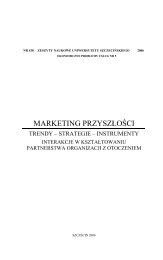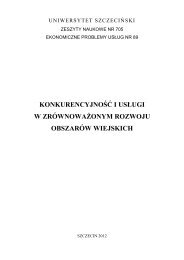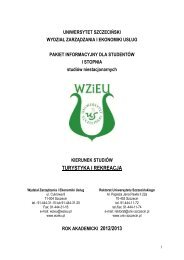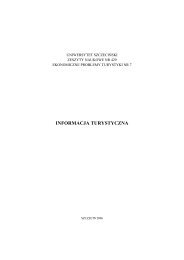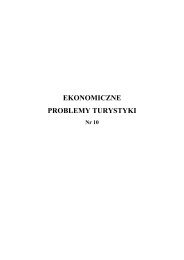- Page 1 and 2: UNIWERSYTET SZCZECIŃ SKIZESZYTY NA
- Page 3 and 4: SPIS TREŚCIWstęp ................
- Page 5: WSTĘPOddajemy do rąk Czytelników
- Page 8 and 9: 8 Dorota Ambrożuk- jakby to wynika
- Page 10 and 11: 10 Dorota AmbrożukW takiej sytuacj
- Page 12 and 13: 12 Dorota AmbrożukOgraniczenie wys
- Page 14 and 15: 14 Dorota Ambrożuknicy odpowiedzia
- Page 16 and 17: 16 Dorota Ambrożukdzialności odsz
- Page 18 and 19: 18 Dorota AmbrożukOdpowiedź na to
- Page 20 and 21: 20 Dorota Ambrożuksowany do innych
- Page 23 and 24: ZESZYTY NAUKOWE UNIWERSYTETU SZCZEC
- Page 25 and 26: Perspektywy poprawy standardów obs
- Page 27 and 28: Perspektywy poprawy standardów obs
- Page 29 and 30: Perspektywy poprawy standardów obs
- Page 31 and 32: Perspektywy poprawy standardów obs
- Page 33 and 34: Perspektywy poprawy standardów obs
- Page 35 and 36: Perspektywy poprawy standardów obs
- Page 37: ZESZYTY NAUKOWE UNIWERSYTETU SZCZEC
- Page 41 and 42: Pricing and fi nancing strategies..
- Page 43 and 44: Pricing and fi nancing strategies..
- Page 45 and 46: ZESZYTY NAUKOWE UNIWERSYTETU SZCZEC
- Page 47 and 48: Doskonalenie świadczenia usług ku
- Page 49 and 50: Doskonalenie świadczenia usług ku
- Page 51 and 52: Doskonalenie świadczenia usług ku
- Page 53 and 54: Doskonalenie świadczenia usług ku
- Page 55 and 56: Doskonalenie świadczenia usług ku
- Page 57: Doskonalenie świadczenia usług ku
- Page 60 and 61: 60 Izabela Dembińskad) Jakie trend
- Page 62 and 63: 62 Izabela Dembińska- rozkład pop
- Page 64 and 65: 64 Izabela Dembińskaczasowej i eko
- Page 66 and 67: 66 Izabela DembińskaRozwójgospoda
- Page 68 and 69: 68 Izabela DembińskaZgodnie z tym,
- Page 70 and 71: 70 Izabela DembińskaZarówno struk
- Page 72 and 73: 72 Izabela Dembińska1 2• Jaka je
- Page 74 and 75: 74 Izabela DembińskaSwoje uzasadni
- Page 76 and 77: 76 Izabela Dembińska- tony przewoz
- Page 78 and 79: 78 Izabela Dembińska- wahania cykl
- Page 80 and 81: 80 Izabela Dembińska% Δtkm - proc
- Page 82 and 83: 82 Izabela DembińskaZa wartościow
- Page 84 and 85: 84 Izabela Dembińskarze transporto
- Page 86 and 87: 86 Izabela DembińskaGranger C.W.J.
- Page 89 and 90:
ZESZYTY NAUKOWE UNIWERSYTETU SZCZEC
- Page 91 and 92:
Rozwój fi rm kurierskich na polski
- Page 93 and 94:
Rozwój fi rm kurierskich na polski
- Page 95 and 96:
Rozwój fi rm kurierskich na polski
- Page 97:
Rozwój fi rm kurierskich na polski
- Page 100 and 101:
100 Tomasz Kwarcińskibędą prowad
- Page 102 and 103:
102 Tomasz KwarcińskiDiagnoza infr
- Page 104 and 105:
104 Tomasz Kwarcińskiw NSRO priory
- Page 106 and 107:
106 Tomasz KwarcińskiNiestety, wś
- Page 108 and 109:
108 Tomasz KwarcińskiFORMATION OF
- Page 110 and 111:
110 Janusz Łacny, Wojciech Zalewsk
- Page 112 and 113:
112 Janusz Łacny, Wojciech Zalewsk
- Page 114 and 115:
114 Janusz Łacny, Wojciech Zalewsk
- Page 116 and 117:
116 Janusz Łacny, Wojciech Zalewsk
- Page 118 and 119:
118 Janusz Łacny, Wojciech Zalewsk
- Page 120 and 121:
120 Janusz Łacny, Wojciech Zalewsk
- Page 122 and 123:
122 Janusz Łacny, Wojciech Zalewsk
- Page 124 and 125:
124 Janusz Łacny, Wojciech Zalewsk
- Page 127 and 128:
ZESZYTY NAUKOWE UNIWERSYTETU SZCZEC
- Page 129 and 130:
Nowe terminale w niemieckich portac
- Page 131 and 132:
Nowe terminale w niemieckich portac
- Page 133 and 134:
Nowe terminale w niemieckich portac
- Page 135 and 136:
Nowe terminale w niemieckich portac
- Page 137:
Nowe terminale w niemieckich portac
- Page 140 and 141:
140 Dariusz MilewskiTeoria logistyk
- Page 142 and 143:
142 Dariusz Milewskinek będzie mó
- Page 144 and 145:
144 Dariusz Milewskimogłoby więc
- Page 146 and 147:
146 Dariusz MilewskiPoziomdecyzjiPr
- Page 148 and 149:
148 Dariusz MilewskiLiteraturaCiesi
- Page 150 and 151:
150 Dawid Milewski, Aleksander Pana
- Page 152 and 153:
152 Dawid Milewski, Aleksander Pana
- Page 154 and 155:
154 Dawid Milewski, Aleksander Pana
- Page 156 and 157:
156 Dawid Milewski, Aleksander Pana
- Page 158 and 159:
158 Dawid Milewski, Aleksander Pana
- Page 160 and 161:
160 Dawid Milewski, Aleksander Pana
- Page 162 and 163:
162 Dawid Milewski, Aleksander Pana
- Page 164 and 165:
164 Dawid Milewski, Aleksander Pana
- Page 166 and 167:
166 Marta Pilarczykmiotów - przeds
- Page 168 and 169:
168 Marta Pilarczyk- Ograniczona do
- Page 170 and 171:
170 Marta Pilarczykwadzić do istot
- Page 172 and 173:
172 Marta Pilarczykdynamika wzrostu
- Page 174 and 175:
174 Marta Pilarczyk1 2 3 4 5 6 7 8
- Page 176 and 177:
176 Marta PilarczykJednocześnie pr
- Page 178 and 179:
178 Marta PilarczykRosnąca przewag
- Page 180 and 181:
180 Marta PilarczykRanking połącz
- Page 182 and 183:
182 Marta PilarczykPrzeobrażeniu u
- Page 185 and 186:
ZESZYTY NAUKOWE UNIWERSYTETU SZCZEC
- Page 187 and 188:
Stan obecny i perspektywy rozwoju f
- Page 189 and 190:
Stan obecny i perspektywy rozwoju f
- Page 191 and 192:
Stan obecny i perspektywy rozwoju f
- Page 193 and 194:
Stan obecny i perspektywy rozwoju f
- Page 195 and 196:
Stan obecny i perspektywy rozwoju f
- Page 197 and 198:
Stan obecny i perspektywy rozwoju f
- Page 199:
Stan obecny i perspektywy rozwoju f
- Page 202 and 203:
202 Ryszard Rolbieckicesów uwzglę
- Page 204 and 205:
204 Ryszard Rolbieckinań, takie ja
- Page 206 and 207:
206 Ryszard Rolbiecki ZlWL ,100gdz
- Page 208 and 209:
208 Ryszard RolbieckiTabela 4Drogi
- Page 210 and 211:
210 Ryszard RolbieckiW powiązaniac
- Page 212 and 213:
212 Ryszard RolbieckiTabela 8Macier
- Page 214 and 215:
214 Ryszard RolbieckiTabela 10Ilora
- Page 216 and 217:
216 Ryszard Rolbieckirii dróg wyno
- Page 218 and 219:
218 Ryszard RolbieckiTabela 11Ilora
- Page 220 and 221:
220 Ryszard Rolbieckiskumulowanym w
- Page 222 and 223:
222 Ryszard RolbieckiW celu przepro
- Page 224 and 225:
224 Ryszard RolbieckiWspółczynnik
- Page 226 and 227:
226 Ryszard Rolbieckisię natomiast
- Page 229 and 230:
ZESZYTY NAUKOWE UNIWERSYTETU SZCZEC
- Page 231 and 232:
Konkurencyjność na rzecz wzrostu
- Page 233 and 234:
Konkurencyjność na rzecz wzrostu
- Page 235 and 236:
Konkurencyjność na rzecz wzrostu
- Page 237:
Konkurencyjność na rzecz wzrostu
- Page 240 and 241:
240 Małgorzata Skweres-Kuchtastwo
- Page 242 and 243:
242 Małgorzata Skweres-KuchtaEurop
- Page 244 and 245:
244 Małgorzata Skweres-Kuchtajuż
- Page 246 and 247:
246 Małgorzata Skweres-KuchtaBenef
- Page 248 and 249:
248 Małgorzata Skweres-KuchtaOpisa
- Page 250 and 251:
250 Małgorzata Skweres-KuchtaRegio
- Page 253 and 254:
ZESZYTY NAUKOWE UNIWERSYTETU SZCZEC
- Page 255 and 256:
Transport- und Verkehrslogistik255e
- Page 257 and 258:
Transport- und Verkehrslogistik257A
- Page 259 and 260:
Transport- und Verkehrslogistik259(
- Page 261 and 262:
Transport- und Verkehrslogistik261D
- Page 263 and 264:
Transport- und Verkehrslogistik263(
- Page 265:
Transport- und Verkehrslogistik265M
- Page 268 and 269:
268 Elżbieta Załoga, Tomasz Kwarc
- Page 270 and 271:
270 Elżbieta Załoga, Tomasz Kwarc
- Page 272 and 273:
272 Elżbieta Załoga, Tomasz Kwarc
- Page 274 and 275:
274 Elżbieta Załoga, Tomasz Kwarc
- Page 276 and 277:
276 Elżbieta Załoga, Tomasz Kwarc



